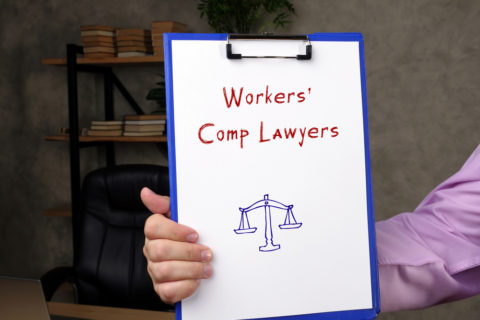How to File a Workers’ Compensation Claim in San Jose
If you’ve been injured on the job, you might wonder, “How do I file a workers’ compensation claim in San Jose?” Here’s the quick and concise answer:
To file a workers’ compensation claim in San Jose, report your injury to your employer immediately, complete the DWC-1 claim form, and submit it to your employer. If your claim is denied, you may need to file an Application for Adjudication of Claim with the Workers’ Compensation Appeals Board (WCAB).
Filing a workers’ compensation claim can be overwhelming, especially while recovering from an injury. With decades of experience helping injured workers in San Jose, our team at Scher, Bassett & Hames is here to guide you through the process and ensure your rights are protected. In this article, I’ll walk you through the steps to file a claim, avoid common mistakes, and secure the benefits you deserve.
What Is Workers’ Compensation?
Workers’ compensation is a state-mandated insurance program that provides benefits to employees who suffer work-related injuries or illnesses. Benefits include medical care, wage replacement, and compensation for permanent disabilities. Filing a claim is the first step to accessing these benefits.

Step 1: Report the Injury to Your Employer
The first step in the process is notifying your employer about your injury or illness. Under California law:
- Timing: You must report the injury within 30 days of the incident or the date you discovered the injury or illness.
- How to Report: Inform your employer verbally or in writing. Provide details about what happened, where it occurred, and the nature of the injury.
Why Prompt Reporting Matters
Failing to report your injury within the required timeframe could jeopardize your claim. Early notification ensures your employer can provide the necessary paperwork and initiate the claims process.
Step 2: Complete the DWC-1 Claim Form
Your employer is required to provide you with a DWC-1 form, which is the official claim form for workers’ compensation in California. Here’s how to complete it:
- Fill Out the “Employee” Section:
- Include your name, address, and details about your injury.
- Describe how and when the injury occurred.
- Submit the Form:
- Return the completed form to your employer.
- Keep a copy for your records.
Your employer will complete the “Employer” section and submit the form to their workers’ compensation insurance carrier.
Step 3: Seek Medical Treatment
After filing your claim, you should:
- Visit an Approved Doctor: Your employer or their insurance carrier will provide a list of authorized medical providers.
- Document Your Injury: Ensure the doctor notes that your condition is work-related. This documentation will be critical for your claim.
- Emergency Situations: In an emergency, seek immediate medical attention. You can visit any provider initially, but you may need to transition to an approved provider for follow-up care.
Step 4: Monitor the Claims Process
Once your claim is submitted, the insurance company has 14 days to respond. Possible outcomes include:
- Approval: You’ll begin receiving benefits such as medical care and temporary disability payments.
- Denial: The insurer may dispute your claim. If this happens, you can appeal the decision (see Step 6).
- Request for Additional Information: The insurer may ask for more documentation to support your claim.
Stay Informed
Maintain open communication with your employer and the insurance company. Keep copies of all correspondence and documents related to your claim.
Step 5: Receive Your Benefits
If your claim is approved, you may be eligible for the following benefits:
- Medical Care: Coverage for treatments, surgeries, medications, and rehabilitation.
- Temporary Disability Benefits: Wage replacement while you’re unable to work.
- Permanent Disability Benefits: Compensation if your injury results in lasting impairments.
- Supplemental Job Displacement Benefits: A voucher for retraining if you can’t return to your previous job.
- Death Benefits: Financial support for dependents in the event of a fatal workplace injury.
Step 6: Appeal a Denied Claim
If your claim is denied, you have the right to appeal the decision. The process involves:
- Filing an Application for Adjudication of Claim:
- Submit this form to the Workers’ Compensation Appeals Board (WCAB).
- Requesting a Hearing:
- A judge will review your case and make a determination.
- Providing Evidence:
- Present medical records, witness statements, and other supporting documents.
- Hiring Legal Representation:
- An experienced workers’ compensation lawyer can help strengthen your case and improve your chances of success.

Common Mistakes to Avoid
To ensure a smooth claims process, avoid these common pitfalls:
- Delaying Injury Reports: Report injuries immediately to avoid losing eligibility.
- Inadequate Documentation: Keep thorough records of medical treatments and communications.
- Missing Deadlines: Submit forms and appeals within the required timeframes.
- Handling the Claim Alone: Consider seeking legal advice to navigate disputes or complex cases.
What Types of Injuries Are Covered by Workers’ Compensation?
Workers’ compensation benefits cover a wide range of injuries and illnesses, including:
- Acute Injuries: Broken bones, sprains, burns, or cuts caused by accidents like falls or equipment malfunctions.
- Repetitive Stress Injuries: Conditions like carpal tunnel syndrome or tendonitis caused by repetitive tasks.
- Workplace Illnesses: Illnesses resulting from exposure to hazardous chemicals or substances.
- Psychological Injuries: Mental health conditions like post-traumatic stress disorder (PTSD) related to workplace events.
Quick Tip: Even if your injury develops over time or doesn’t seem severe initially, report it to your employer as soon as possible.
What Are Your Rights Under California Workers’ Compensation Laws?
As an injured worker in San Jose, you are entitled to certain rights under California law, including:
- Medical Treatment: The right to receive medical care for your work-related injury at no cost to you.
- Wage Replacement: Temporary disability benefits if your injury prevents you from working.
- Return-to-Work Assistance: Access to supplemental job displacement benefits if you can no longer perform your job duties.
- Legal Protections: Protection from retaliation or discrimination for filing a claim.
Quick Tip: If you believe your employer is violating your rights, consult with an attorney immediately.
How Long Do You Have to File a Workers’ Compensation Claim?
In California, you must meet specific deadlines to preserve your right to benefits:
- Report the Injury: Notify your employer within 30 days of the injury or the date you became aware of it.
- File the DWC-1 Form: Submit the claim form to your employer promptly after reporting the injury.
- File an Appeal: If your claim is denied, file an appeal with the WCAB within one year of the denial.
Quick Tip: Missing these deadlines could jeopardize your ability to recover benefits.

What to Do if Your Employer Refuses to Provide a Claim Form
If your employer refuses to provide you with the DWC-1 claim form, take the following steps:
- Document the Request: Keep a written record of your attempts to obtain the form.
- Contact the Insurance Carrier: Ask your employer’s workers’ compensation insurance company for the form directly.
- File a Complaint: Report the issue to the California Division of Workers’ Compensation (DWC).
- Consult an Attorney: Seek legal advice to protect your rights and ensure compliance with state laws.
Quick Tip: Employers are legally obligated to provide the claim form within one working day of your report.
What Happens If You Can’t Return to Work?
If your injury prevents you from returning to your previous job, you may be eligible for additional benefits:
- Supplemental Job Displacement Benefits (SJDB): A voucher for retraining or skill enhancement programs.
- Permanent Disability Benefits: Compensation for long-term or permanent impairments that affect your earning capacity.
- Alternative Work Opportunities: Employers may offer modified or alternative job roles to accommodate your restrictions.
Quick Tip: Document your inability to work with detailed medical evaluations to support your claim.
When Should You Consult a Workers’ Compensation Attorney?
While not all claims require legal representation, consider hiring an attorney if:
- Your claim is denied.
- You believe your benefits are being unfairly delayed or reduced.
- You experience retaliation, such as termination or harassment, after filing a claim.
- You face a complex case involving permanent disability or third-party liability.
Quick Tip: An experienced attorney can negotiate with insurers, navigate appeals, and ensure you receive the full benefits you deserve.
How Scher, Bassett & Hames Can Help
Filing a workers’ compensation claim can feel overwhelming, but you don’t have to do it alone. The experienced attorneys at Scher, Bassett & Hames can:
- Guide you through the claims process.
- Handle disputes and appeals.
- Maximize the benefits you’re entitled to receive.
Contact Us Today
Don’t let a workplace injury disrupt your life. Call 408-739-5300 or fill out our online form to schedule a free consultation. Let us help you secure the compensation and justice you deserve.
Related Content:
- How Long Does It Take for a Workers Comp Settlement in California?
- Understanding Workers’ Compensation Claims
- How Much Do Workers Comp Lawyers Charge in California?
FAQs About Filing a Workers' Compensation Claim in San Jose
How long do you have to report a workplace injury in San Jose?
What happens after filing a workers' compensation claim in California?
Can you choose your own doctor for workers' compensation in California?
What benefits are available through workers' compensation in San Jose?
Medical care: Treatments, medications, and surgeries.
Temporary disability benefits: Wage replacement during recovery.
Permanent disability benefits: Compensation for lasting impairments.
Job displacement benefits: Vocational training vouchers.
Death benefits: Financial support for dependents.
What should you do if your workers' compensation claim is denied?
1. File an Application for Adjudication of Claim with the WCAB.
2. Request a hearing before a workers' compensation judge.
3. Present evidence such as medical records and witness statements.
4. Consult an experienced attorney to strengthen your case.



